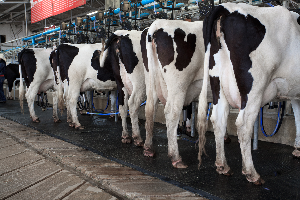Hollanda Ekonomik- Sosyal Konseyi (SER): Günümüzdeki hayvancılık uygulamalarının savunulacak hiçbir yönü kalmadı, hemen harekete geçilmeli.
Hollanda Ekonomik- Sosyal Konseyi (SER) en son yayınladığı “Sürdürülebilir hayvancılık uygulamalarının hızlandırılması” konulu raporunda çok acilen bu konuyla ilgilenilmesi gerektiğini belirtiyor. Hükümet adeta bir yönetmen rolü üstlenerek sürdürülebilirlik konusunda öncü olan, sektörün yaklaşık %30’unu oluşturan bir gruba destek vermeli, geri kalanını da kapatılması konusunda ikna etmelidir. PvdD SER’in bu önerileri ile hemfikirdir. Aynı şekilde daha fazla zaman verilmesi konusunun da artık sonlandırılması gerektiği konusunda da. Parti başkanı Marianne Thieme devlet bakanı ile bu acil öneriler hakkında bir görüşme başlatmak istediğini belirtti.

SER’e göre sürdürülebilir hayvan refahı, toplum sağlığı ve yenilik gibi unsurlara önem veren, hayvancılık konusunda öncü olan firmaların özellikle güçlendirimesi ve desteklenmesi gereklidir. SER ve Hayvanları Koruma partisi, tarım ve hayvancılığın sürdürülebilir hale getirilmesi konusunda devletin bir yönetmen rolü üstlenmesinin vaktinin geldiği konusunda hemfikirler.
“Aynı SER gibi, düzenleme için zaman verilmesi uygulamasının artık son bulması gerekli diye düşünüyoruz” diye belirtiyor Marianne Thieme. “Hayvancılık sektörü bu şekilde sürdürülemez, hem çiftçi hem hayvanlar hem de çevre sağlığı açısından. Devlet üzerine düşeni yapamadığından, hayvancılık sektörünün kendinden sorumlu olması bugüne kadar iyi bir sonuç getirmedi. Hollanda Habitat Enstitüsü, Hükümet Politikaları Bilimsel Danışma Kurulu ve şimdi de Hollanda Ekonomik- Sosyal Konseyi (SER) gibi bir çok tavsiye organı alarm veriyor. Artık harekete geçmek gerek!”
Hayvanları Koruma Partisi bundan böyle sadece biyolojik sürdürülebilir tarım ve hayvancılığa yatırım yapılması gerektiğini savunuyor. Hükümet hayvan sayısının çok büyük ölçüde azaltıması ile ilgilenmeli. Domuz ticareti yapan işletmelerin gelirlerinin %30’u devlet desteğinden kaynaklanıyor, bu oran süt ürünleri işletmelerinde %60. Büyükbaş hayvancılık işletmelerinde devletten kaynaklanan gelir oranı ise %92.
The SER (Social and Economic Council of the Netherlands) has concluded in its report on accelerating sustainable farming that accelerated action against current livestock farming is essential. The government will need to play a strong director’s role and only the “vanguard” of sustainable livestock farmers – about 30 % of all Dutch farmers – should receive financial support. The remaining farmers should be enabled to stop farming. The Party for the Animals agrees with the SER’s recommendations, as well as the conclusion that the days of self-regulation and good intentions are over. Chairman Marianne Thieme seeks to hold a debate with the State Secretary on these urgent recommendations.

According to the SER, providing specific enforcement and support to the vanguard of sustainable farmers, who give the highest priority to animal welfare, public health and innovation among other things, is essential. As well as the Party for the Animals, the SER believes that herein lies an important director’s role for the government to finally take up the task of sustainable livestock farming.
“The SER is right in saying that the days of non-commitment and empty promises are over,” Marianne Thieme says in response to the recommendations of the SER. “Livestock farming is unsustainable, for farmers as well as animals, environment and public health. Self-regulation has not benefited farming in any way, and the government has taken no responsibility. Many government advisory bodies have sounded the alarm: the Netherlands Environmental Assessment Agency, the Scientific Council for Government Policy and now the SER. It is time to start listening.”
The Party for the Animals wants the government to invest only in sustainable, organic farming. Cattle numbers should be drastically reduced. At present, over 37 percent of a pig holding income is dependent on subsidies, as well as 60 percent of a dairy farm income and more than 92 percent of a veal calf holding income.